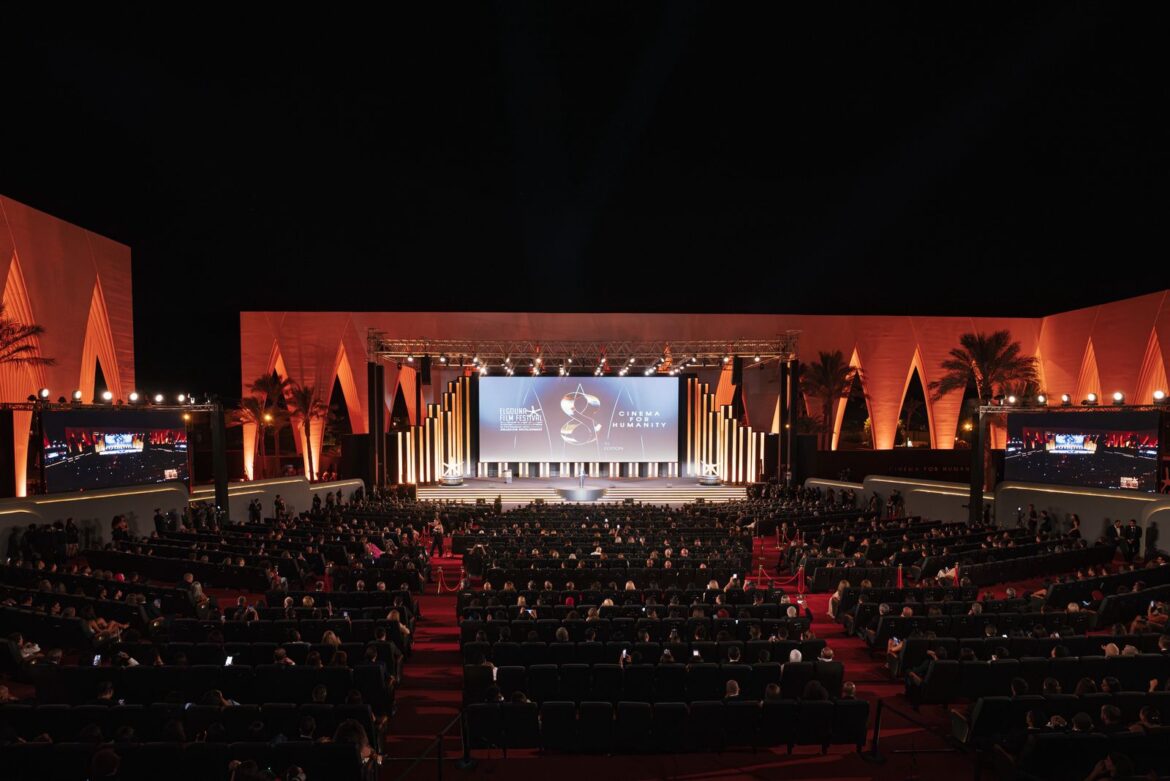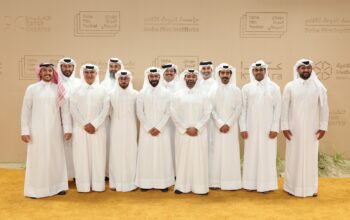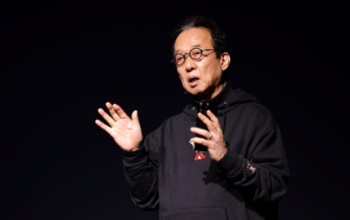The activities of the eighth edition of the El Gouna Film Festival, which lasted for nine days, concluded amid a distinctive festive atmosphere in El Gouna.
The closing ceremony was attended by a group of prominent figures, including Engineer Naguib Sawiris, founder of the festival and Chairman of Orascom Investment Holding; Engineer Samih Sawiris, founder of El Gouna and Chairman of the Festival’s Board of Directors; and the distinguished actress Yousra, a member of the festival’s International Advisory Board. Also in attendance were Mohamed Amer, CEO of El Gouna and Managing Director of Orascom Development Egypt; Amr Mansi, co-founder and executive director of the festival; Marianne Khoury, the festival’s artistic director; and Intishal Al Tamimi, former director of the festival and member of the Supreme Advisory Committee.
The ceremony included the distribution of awards to the winning films in the various competitions, including the Feature Narrative, Feature Documentary, Short Film, and Cinema for Humanity competitions. A group of films that stood out this year for their creativity and outstanding artistic content were honored.
The ceremony, hosted by media personality Nardine Farag, began with the playing of the national anthem. The host expressed her gratitude to the festival’s sponsors, who contributed to the success of this edition, which celebrated the magic of cinema and the power of human creativity. It brought together filmmakers from around the world in a unique artistic experience that supported young talent and affirmed El Gouna’s position as a leading platform for cinema in the region.
She then introduced Engineer Samih Sawiris, who delivered a speech in which he said: Engineer Samih Sawiris began his speech by joking with his brother Naguib, saying, “The family decided that I would speak in English, and he would speak in Arabic, because his English isn’t very good.” He added, “The new generation in the family asked me to make you laugh at least two or three times before I leave the stage, so you’d better laugh quickly, or I’ll stay here all night.”
Sawiris continued, “In truth, I’m very proud and grateful to have been able to attend the festival for all these years without having to do anything but enjoy myself. And for that, for the first time, I would like to extend my greetings to Amr Mansy and his team. I think he’ll appreciate this thanks very much, because he knows me well and knows that I’m very stingy with compliments, so I reiterate my thanks to him.”
He pointed out, “For next year, we need to see more people who might need my English, because I feel we’ve been able to attract everyone who should be here, from Egypt and other countries, because we want this festival to be truly international.”
At the end of his speech, Sawiris hoped the audience would enjoy the evening and not get bored, and he extended his greetings to everyone.
He was followed by Amr Mansi, co-founder and executive director of the festival, who said in his speech, “The El Gouna Film Festival would not have been held without you—without all the filmmakers, the jury members, and every talent who came here to present their project or build a new network. You are the true engine of the festival.” From day one, we defined our vision with the festival’s return three years ago. We stated that our focus would be on industry, industry, industry, and more industry. We also stated that the slogan ‘Cinema for Humanity’ must be truly implemented, not just remain a slogan.”
Mansi noted that “the great artist Cate Blanchett visited the festival because she believed in its humanitarian message, and this in itself confirms that we are on the right path. Today, we clearly see that humanitarian issues have become the core and focus of the festival, and this is evident in moving events like the Light and Hope Orchestra concert, which touched all of our hearts.”
Amr expressed his pride in the numbers proving the festival’s growth year after year, explaining, “Last year, we received 5,500 accreditation requests, while this year the number reached 7,500. Cinema tickets also increased from 20,000 to 33,000. The festival, once described as elitist, has now become a truly popular festival.” He added, “I extend my sincere thanks to every member of the El Gouna Film Festival team and to every worker in this city. Thanks to your continuous efforts, the festival has achieved this honorable success.” He emphasized, “I believe we have established a strong foundation that will make El Gouna Film Festival a recognized international festival, featuring some of the world’s most prominent films and filmmakers. I believe this year will be a new beginning toward global recognition, and that the festival will be even stronger in the future.”
Nagib Sawiris then took the stage, responding to his brother Samih’s joke by saying, “I will speak in English to prove that my English is good.” He added, “Cinema is an addiction for me. Not a day goes by without me watching a film. When I watch a film, I experience it as if I’m reading a book, completely immersed in it. The beauty of cinema is that it makes you laugh and cry. I believe that cinema is a powerful humanitarian tool and an essential means of promoting it.”
He emphasized, “Since the first day of the El Gouna Film Festival, our slogan has been ‘Cinema for Humanity.’ I would like to draw your attention to the two films that will win the award in this category, because they truly speak deeply about the meaning of humanity. A few days ago, I watched a film called Caramel on Netflix, and I recommend you watch it.”
Engineer Naguib pointed out that “we currently live in a crazy world, and we must not turn a blind eye to the tragedies that humanity is experiencing: the people being exterminated in Sudan, the families in Ukraine being bombed and facing the harsh winter without warmth, and the children of Gaza, because the role of cinema is to shed light on these issues.”
Following his speech, Eng. Naguib Sawiris presented a special recognition award to Intishal Al Tamimi, the former festival director and member of the International Advisory Board, in recognition of his contributions to the festival.
The Cinema for Humanity Audience Award was then announced and presented by Eng. Naguib Sawiris. The award was shared between Happy Birthday (Egypt), directed by Sarah Gohar, and Put Your Soul on Your Hand and Walk (France, Palestine), directed by Sepideh Farsi. The Cinema for Humanity Audience Award – El Gouna Star, worth $20,000, was awarded jointly to the El Gouna Star, a $20,000 prize.
The El Gouna Green Star jury then announced the winner of the El Gouna Green Star, the documentary Seeds (USA), directed by Brittany Shine. Through poetic black-and-white images, the film explores the decline of Black farmers generation after generation and the importance of land as a symbol of identity and survival, through a humane portrait of farmers over 100 years old in the American South.
The El Gouna Green Star jury consisted of: Jana Wehbe, producer and cultural activist (Lebanon), Mai El Gheity, actress and activist (Egypt), and Niklas Engström, artistic director of the Copenhagen Documentary Film Festival (Denmark).
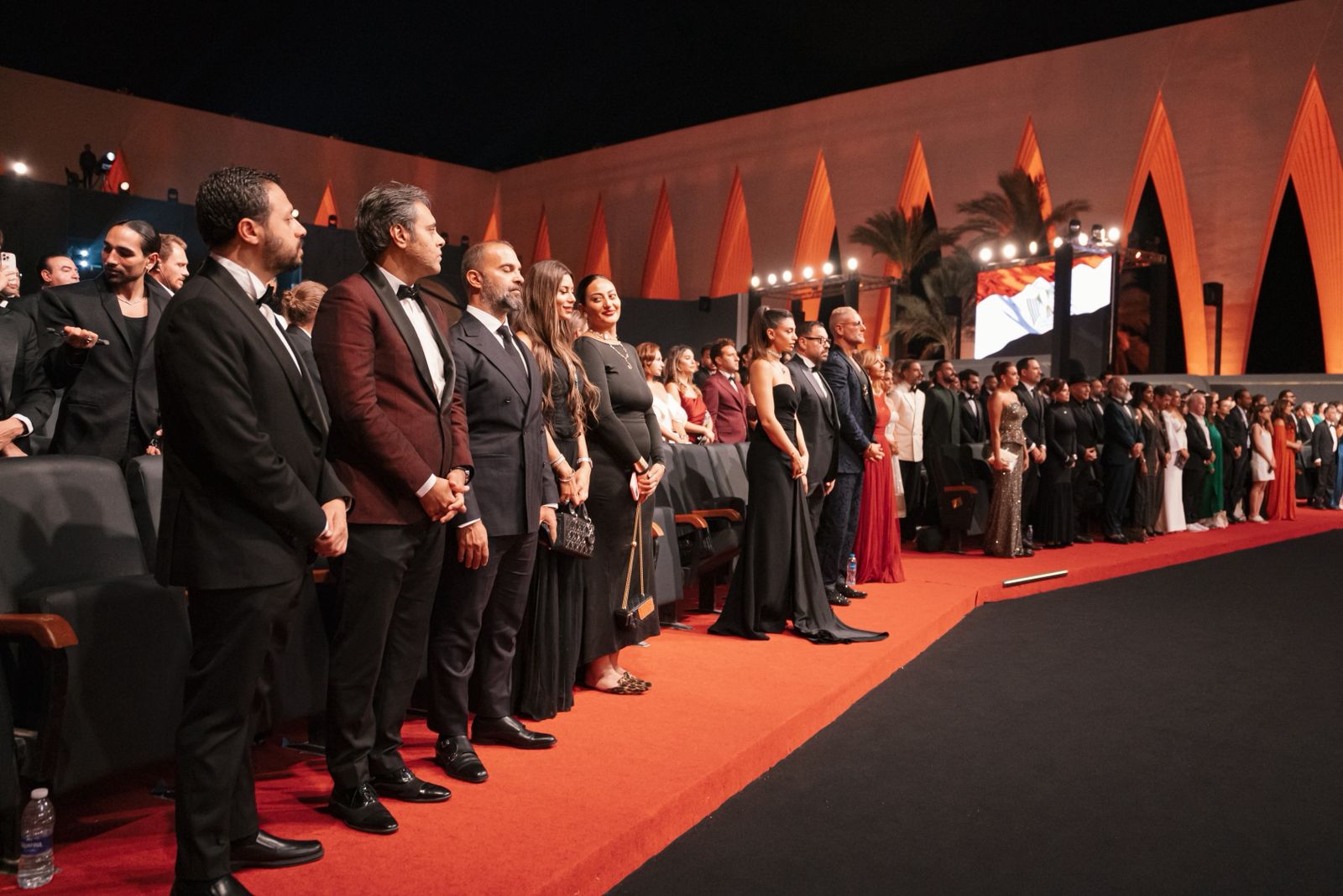
Short Film Competition
The awards for the Short Film Competition were then announced. The El Gouna Star for Best Arab Short Film, worth $5,000, went to The Devil and the Bicycle (France, Lebanon), directed by Sharon Hakim. The film tells the story of Yasma, a 13-year-old Lebanese girl born into a mixed-faith marriage, who is preparing for her First Communion. However, her early awakening of femininity leads her to undergo a completely different ritual.
The El Gouna Bronze Star for Best Short Film, worth $4,000, went to Water Girl (France, Netherlands, Portugal), directed by Sandra Desmazières. This award tells the story of Mia, a free-diving and fishing girl whose life is affected by time and the effects of her surroundings. She relives her memories one poignant night.
The El Gouna Silver Star Award for Best Short Film, worth $7,500, went to “Lions” (Belgium, France, North Macedonia, United Kingdom), directed by Dorian Jespers. This Kafkaesque courtroom drama, set in 19th-century Liverpool, revolves around an unnamed corpse being tried in an absurd ritual, as those present seek justice.
The El Gouna Golden Star Award for Best Short Film, worth $15,000, went to “Agapeto” (Philippines, France), directed by Kayla Daniel Romero and Arvin Belarmino. The film takes place on the last day of the month inside an old bowling alley, where cone installers prepare to welcome a special visitor with a song-and-dance performance.
The Short Film Competition jury was chaired by director Mahdi Fleifel (Denmark, Palestine) and included Andrea Gatopoulos (Italy), Juliette Cano, programmer at the Critics’ Week at the Cannes Film Festival (France), Suad Bushnak, composer (Jordan, Canada), and Mustafa El Kashef, director of photography and producer (Egypt).
Feature Documentary Competition:
The jury awarded a special mention to “How to Build a Library” (USA), directed by Maya Leko and Christopher King. This film follows two Nairobi women who strive to transform a library that was reserved for whites until 1958 into a vibrant cultural center, despite the political, financial, and historical challenges they face.
Life After Siham (France, Egypt), directed by Nemir Abdel Massih, won the El Gouna Star for Best Arab Documentary Film, worth $10,000. The film also won the El Gouna Silver Star for Best Documentary Feature, worth $15,000. The film explores the director’s relationship with his late mother, Seham, on a journey between Egypt and France, reflecting on the meaning of loss, exile, and love.
The El Gouna Bronze Star for Best Documentary Film, worth $7,500, went to “Orwell: 2+2=5” (USA, France), directed by Raoul Peck. Combining archival footage with excerpts from “1984”, this award offers a profound insight into George Orwell’s genius and the impact his ideas have on our contemporary reality.
The El Gouna Golden Star for Best Documentary Feature, worth $30,000, went to “Always” (USA, France, China, Taiwan), directed by Deming Chen. This cinematic metaphor for a boy’s journey to becoming a teenager in rural China, evoking the poetics of isolated childhood and the growth of human consciousness.
The Feature Documentary Competition jury was chaired by French director Nicolas Philibert and included: Asmaa El Madar (Morocco), writer, director, and producer; Sona Karaboghossian (Armenia), film critic and programmer; Mohamed Said Ouma, Executive Director of Decommunité Africa (Réunion Island); and Hala Galal, writer, director, and producer (Egypt).
Feature Narrative Competition:
The jury awarded a special mention to “The Pilgrimage” (Spain, Germany), directed by Carla Simon. This film tells the story of Marina, who, while searching for official documents to enroll in university, discovers long-buried family secrets.
Léa Drucker won the El Gouna Star for Best Actress for her role in “For Adam” (Belgium, France), directed by Laura Wandel. Ahmed Malek won the El Gouna Star for Best Actor for his role in “Cologne” (Egypt, Norway, Sweden, Saudi Arabia, Qatar, France), directed by Mohamed Siam.
The El Gouna Star Award for Best Arab Feature Film, worth $20,000, went to “Where the Wind Takes Us” (Tunisia, France, Qatar), directed by Amal Guellaty. This film depicts the journey of two rebellious teenagers who escape their reality through fantasy and adventure.
The Colony (Egypt, France, Germany, Qatar, Saudi Arabia), directed by Mohamed Rashad, won the El Gouna Bronze Star Award, worth $15,000. The film revolves around two brothers from a marginalized community in Alexandria who, after their father dies in a factory accident, are offered a job at the same factory.
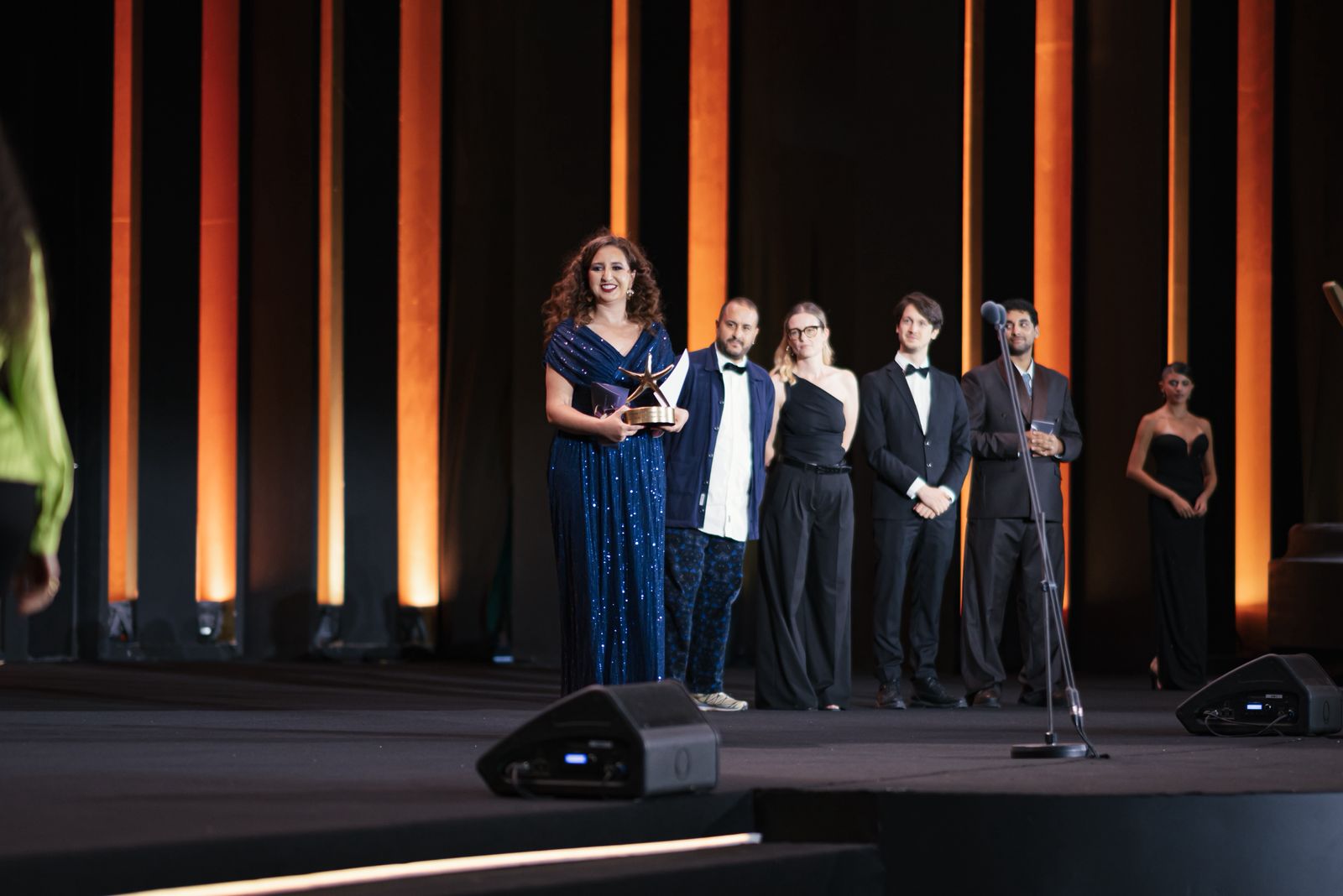
The El Gouna Silver Star Award, worth $25,000, went to Lucky Lu (Canada, USA), directed by Lloyd Lee Chui. In his debut feature, Lloyd Lee Chui follows Lu, a Chinese delivery man in New York City, whose fragile world begins to crumble after losing his job, forcing him to confront the concepts of family, survival, and luck in an unforgiving city.
The El Gouna Golden Star Award for Best Feature Film, worth $50,000, went to Poet (Colombia, Germany, Sweden), directed by Simon Mesa Soto. This award tells the story of an aging poet struggling between art and isolation until he meets a teenage girl who changes the course of his life.
The jury was chaired by actress Laila Elwi (Egypt), and included Giona A. Nazzaro, Artistic Director of the Locarno Film Festival (Switzerland); Rashid Masharawi (Palestine, France), Director and Producer; Kani Koshrutti, Actress (India); and Nahuel Pérez Biscayart, Actor (Argentina).
The ceremony concluded with a musical performance by Ahmed Saad, who performed a selection of his famous songs, including “Eh El Yom El Helw Dah” (What a Sweet Day) and “Maksarat” (Nuts). He concluded the performance with “Khalik Hena” (Stay Here), a song he composed specifically for the closing ceremony of El Gouna Film Festival.
Behind the Camera Awards:
El Gouna Film Festival also announced the second edition of the Behind the Camera Award, presented on Thursday evening, to honor artists and those working behind the camera and celebrate their creative contributions to the film industry.
The Behind the Camera Award is a pioneering initiative that aims to highlight creative individuals who have influenced the film industry through their expertise in key fields such as editing, costume design, cinematography, music composition, and set design. The award aims to recognize the vital roles these professionals play in bringing cinematic visions to life and fostering a spirit of collaboration and creativity within the industry.
This year’s “Behind the Camera for Creative Achievement” award went to director of photography Dr. Tarek El Telmissany, in recognition of his artistic career and significant contributions to Egyptian and Arab cinema. Abdel Salam Moussa and Mustafa Fahmy accepted the award on his behalf.
The “Behind the Camera” award aims to recognize recent works that have demonstrated innovation, creativity, and technical expertise, significantly contributing to the advancement of artistic quality and success of film projects released between the previous and current editions of El Gouna Film Festival. This year’s winner, Heba Othman, won the editing category.
El Gouna Film Festival is held in partnership with Orascom Development and its destination Tuban Islands, hosted by El Gouna, with El Nahar TV as the official broadcaster, Cairo Design District (CDD) as the official art and design partner, BMW as the luxury car partner, Abou Ghaly Motors as the official mobility partner, Orange as the official telecom partner, Pepsi as the official beverage, Commercial International Bank (CIB) as the official partner, in collaboration with On the Run, Sawiris Foundation for Social Development as the impact supporting partner, Ticket Egypt as the official ticket partner, Nespresso as the official partner, Dolato as the official gelato partner, Limitless Naturals as the healthy lifestyle partner, MAC as the official shine sponsor, Kenda as the official furniture partner, EgyptAir as the official carrier, in collaboration with Nescafé, and under the auspices of the Egyptian Tourism Promotion Authority, the Ministry of Tourism and Antiquities, and the Egyptian Ministry of Culture. The festival is also sponsored by Mohamed El Sagheer as the official beauty partner, Middle East Glass as the sustainability partner, and TLT & Villa Coconut as the hospitality partner. The plaza was designed by Ali Hossam Ali (Design Studio), lighting design by Mostafa Fahmy (Light Design), and organized by iEvents.
Published Oct 24, 2025
